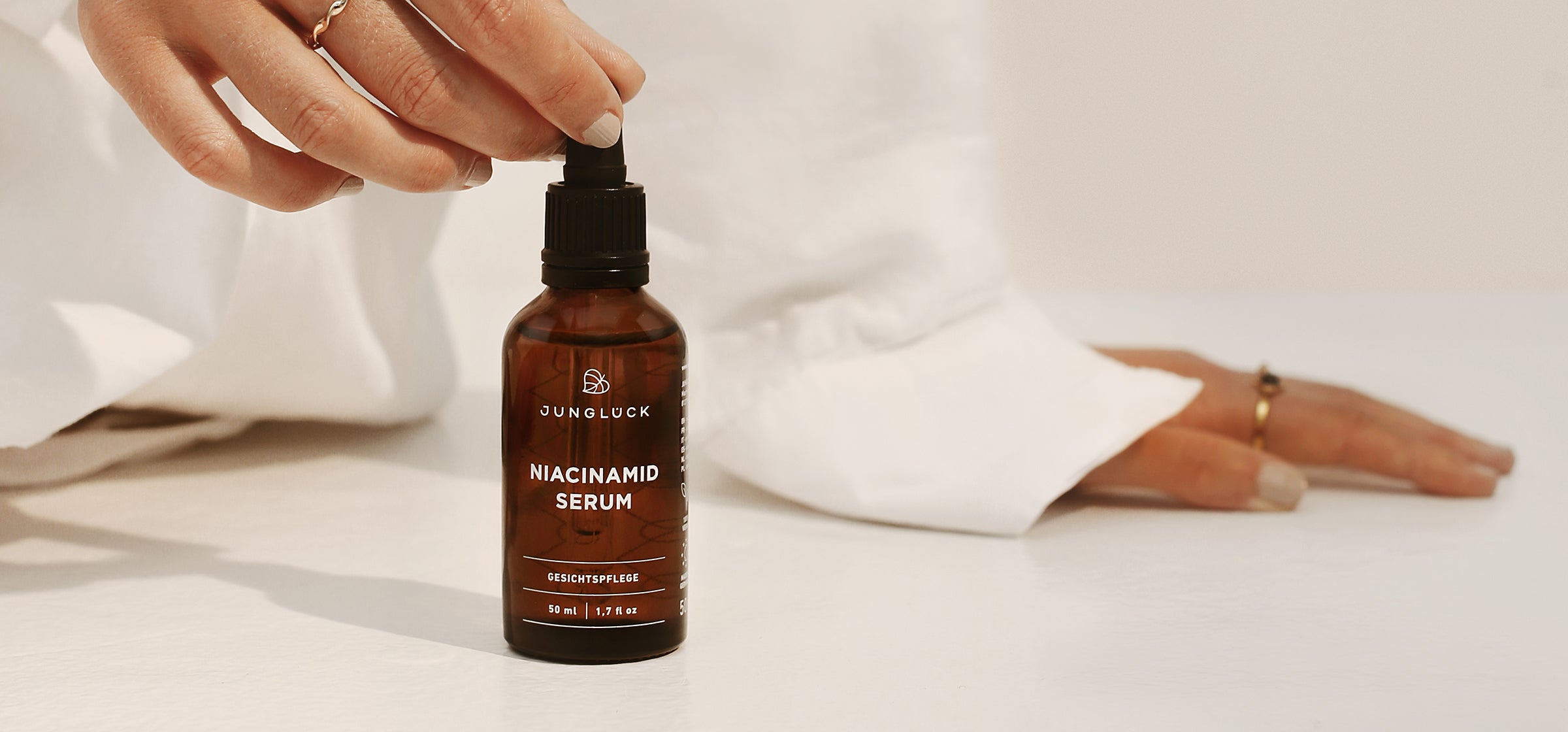
June 21, 2021
Niacinamide: Tongue twister but gentle skin care hero
by Lena Severin
- What is niacinamide?
- What does niacinamide do in our body?
- What can niacinamide do in cosmetics?
- Niacinamide for skin diseases & conditions?
- Niacinamide: New hero in the bathroom cabinet
1. What is niacinamide?
Niacinamide is a substance produced naturally in the body. Or, more precisely, the active, water-soluble form of vitamin B3. Niacin is produced in the liver from the very valuable amino acid tryptophan, but unfortunately not enough to cover our entire needs. But don't worry, we also get niacin from food. Fish and meat in particular, but also beans, peanuts and mushrooms are rich in niacin.
2. What does niacinamide do in our body?
Niacinamide is the active form of vitamin B3. In the form of the two energy building blocks NAD+ and NADP+, it is involved in numerous processes in the body. These include, for example, processes of protein, fat and carbohydrate metabolism. This means that it is crucial for good and rapid regeneration of the nervous system, muscles and skin.

3. What can niacinamide do in cosmetics?
Regenerates & protects
Niacinamide supports the natural regeneration of the skin, builds up the natural skin barrier and protects it. Studies have shown that even damaged skin can regenerate through the continuous use of niacinamide, especially when damaged by dryness.
Improves the skin’s appearance
Recent studies have shown that after 3 months of using niacinamide, hyperpigmentation, skin disorders, yellowing and large pores were significantly reduced.
Particularly cares for mature skin
Vitamin B3 stimulates collagen production, the substance that keeps the skin elastic and plump. In combination with its regenerative properties, niacinamide ensures greater elasticity and refined wrinkles.
Has an anti-inflammatory effect
Niacinamide prevents the spread of inflammatory molecules, bacteria and viruses on the skin.
Relieves itching and dryness
It supports the formation of the skin's own ceramides, the building blocks of the skin barrier. This allows the skin to regenerate, protect itself naturally and stabilize the moisture balance. It also inhibits the release of histamine in the cells, which is involved in triggering itching.
Moisturizes
By building up and supporting the skin barrier, the skin can naturally stabilize its own moisture balance.
4. Niacinamide for skin diseases & conditions?
Especially when the skin is sick or particularly demanding, the search for compatible, effective cosmetics can be quite nerve-wracking. If you can classify your skin as one of these, niacinamide could be worth a try to bring it back to its healthy functionality in a natural way. Of course, we always recommend a visit to your dermatologist or beautician first to get an accurate diagnosis for your skin and to clarify any questions you may have.
Acne vulgaris
It reduces sebum production, has an anti-inflammatory and regenerative effect, which can lead to a visible improvement in the skin's appearance. Studies have shown that less sebum is produced after just 2-4 weeks. Pustules, papules and comedones noticeably reduced in 82% of the test subjects after 8 weeks.
Melasma
Niacinamide reduces melanin production, thereby reducing hyperpigmentation.
Atopic dermatitis and rosacea
The water loss of the skin is significantly reduced by the stimulated production of ceramides, free fatty acids and cholesterol in the stratum corneum of the skin. Due to its anti-inflammatory effect, niacinamide can reduce papules and inflammatory redness in most cases. The general structure, appearance and elasticity of the skin are also improved because niacinamide indirectly stimulates keratin production.
Skin cancer
UV radiation damages our DNA. If our repair mechanism does not work properly, there is increased cell death and a disturbed energy metabolism in our cells. This increases the risk of developing skin cancer. The use of niacin has been proven to inhibit the production of inflammatory substances that damage DNA.

5. Niacinamide: New hero in the bathroom cabinet
It's no surprise that niacinamide is becoming increasingly popular in cosmetics, given its many benefits, is it? Especially now, during the time of sunbathing, days at sea and summer hikes, the niacinamide serum can do us some good thanks to its regenerative and cell-protecting effect: namely, keeping our skin in balance and supporting its natural functions.
Our serum contains 10% niacinamide and you can use it in your skincare routine either in the morning and evening or just at one time of day. To use, after cleansing, put a drop each on your chin, cheeks, nose and forehead and massage gently from the inside out. Before you use a cream or one of our oils, you should give the niacinamide serum a few minutes to work.
If you also use the AHA or BHA peeling, we do not recommend using both products in the same routine. However, if you apply one of the peelings in the evening and the niacinamide serum in the morning, you can get the most out of both products with peace of mind.
By the way, we have added aloe vera and hyaluronic acid to our niacinamide serum to give your skin even more moisture. Goodbye dry and dehydrated skin! Are you curious? Take a look at the product details page and find out more about the ingredients and effects of our niacinamide serum:







